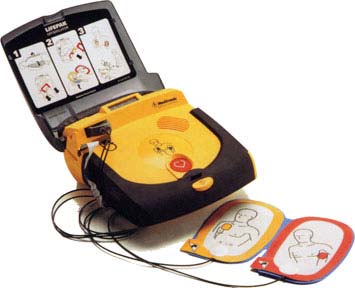Network Rail and Transport for Wales have been working in partnership to install life-saving defibrillators in a number of railway stations across the Wales and Borders route.
A defibrillator is a device that gives a high energy electric shock to the heart of someone who is in cardiac arrest.
Whilst a number of Transport for Wales’ busiest stations have defibrillators, this investment in stations in Wales and England covers a range of cities, towns and village communities.
Within this tranche of funding, 21 railway stations have been equipped with defibrillators at a cost of more than £21,000 and the roll out of their installation has now been completed, having started in March this year.
The newly installed defibrillators are known as public access defibrillators (PADs) as anyone can use them. No training is needed to use the PADs. There are clear instructions on how to attach the defibrillator pads. The pads then assess the heart’s rhythm and will only instruct and allow the user to deliver a shock if it is needed. The user cannot deliver a shock accidentally.
The funding of this programme of work came from the Department for Transport, as part of its National Stations Improvement Programme.
While other railway stations carry defibrillators on the Wales and Borders route, the 21 stations that benefitted from this funding include:
Holyhead, Bangor, Llandudno Junction, Llandudno Town, Colwyn Bay, Rhyl, Wrexham, Prestatyn, Flint, Hereford, Carmarthen, Cathays, Treherbert, Rhymney, Trefforest, Llanelli, Craven Arms, Knighton, Llandrindod Wells, Pontarddulais and Llandeilo.
Bill Kelly, Network Rail’s route director for Wales and Borders, said:
“Putting passengers first is at the very heart of what we aim to achieve at Network Rail and nothing could be more important than the health and wellbeing of the passengers that travel on our network. The roll out of more defibrillators to more stations really could mean the difference between life and death.
“According to the Resuscitation Council UK, only 3% of cardiac arrests happen within the recommended retrieval distance of a defibrillator and as the British Heart Foundation points out, for every minute it takes for a defibrillator to reach someone to deliver the shock needed, chances of survival reduce up to 10%. With railway stations often experiencing high numbers of people passing through each day, there is a decent chance that at some point someone will be taken ill and in need to this piece of equipment, so having more of them in more stations really will make a difference.
Colin Lea, Customer Experience Director, from Transport for Wales, added
“It’s fantastic news that we’ve been able to install these new defibrillators around our network in partnership with Network Rail.
“We are blessed to serve both incredibly busy cities and urban areas, beautiful seaside towns and rugged and remote locations across Wales and the borders.
“However not all have immediate access to medical provision, so to help in some way is something we fully support. We know our stations are not just places to get on a train, they are important community facilities. This investment reflects that and these defibrillators will be available to anyone in need in those areas.”
The British Heart Foundation has issued the following four steps to take if someone is having a cardiac arrest:
- Call 999;
- Start CPR;
- Ask someone to bring a defibrillator if there is one nearby;
Turn on the defibrillator and follow the instruction.
Help keep news FREE for our readers
Supporting your local community newspaper/online news outlet is crucial now more than ever. If you believe in independent journalism, then consider making a valuable contribution by making a one-time or monthly donation. We operate in rural areas where providing unbiased news can be challenging. Read More About Supporting The West Wales Chronicle





















